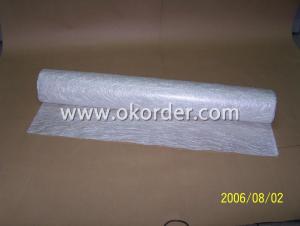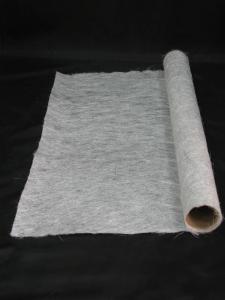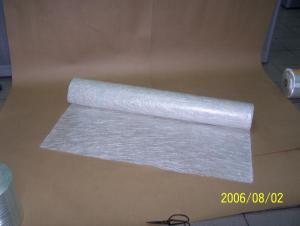C-glass Chopped Strand Mat Fiberglass Raw Material
- Loading Port:
- China Main Port
- Payment Terms:
- TT or LC
- Min Order Qty:
- 20000 kg
- Supply Capability:
- 600000 kg/month
OKorder Service Pledge
OKorder Financial Service
You Might Also Like
Fiberglass chopped strand mat is a non-woven E-or C-glassfiber mat, product manufactured by spreading continuous filament roving of 50mm in length randomly and uniformly in combination with polyester binder in powder form(or other binder in emulsion form). This product is characterized by good combination of resin, easy operation, good wet strength retention, good laminate transparency and low cost. It is suitable for the applications of hand lay-up FRP molding, such as: various sheets and panels, boat hulls, cooling towers, corrosion resistant, vehicles etc.
Product Function
Fiberglass chopped strand mat is chopped using the “E” chopped glass and emulsion adhesive bond. It is suitable for hand lay and can enhance the unsaturated polyester resins.
Packaging & Delivery of C-glass Chopped Strand Mat
Packaging Detail: | cartons and pallets |
Delivery Detail: | within two weeks |
Main Features of C-glass Chopped Strand Mat
C-glass fiber chopped strand mat:
1. good wet-out
2. evenly distribution of fiber and binder
3. high mechanical strength etc.
Specification C-glass Chopped Strand Mat
We could provide E-Glass Powder Chopped Strand Mat and E-Glass Emulsion Chopped Strand Mat.
Specs | Roll length(m) | Width(mm) | Roll weight(kg) | Compatible Resin |
EMC225 | 1040mm | 144 | 30 | UP VE |
EMC300 | 1040mm | 96 | 30 | UP VE |
EMC380 | 1040mm | 80 | 30 | UP VE |
EMC450 | 2080mm | 64 | 60 | UP VE |
EMC600 | 2080mm | 48 | 60 | UP VE |
EMC900 | 2080mm | 32 | 60 | UP VE |
The products is raw material to produce FRP products.
Binder type: Emulsion or Power
Packing: by carton or by pallet, or as your requested
Pictures of C-glass Chopped Strand Mat
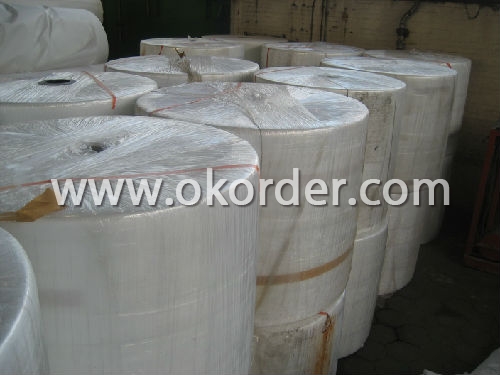
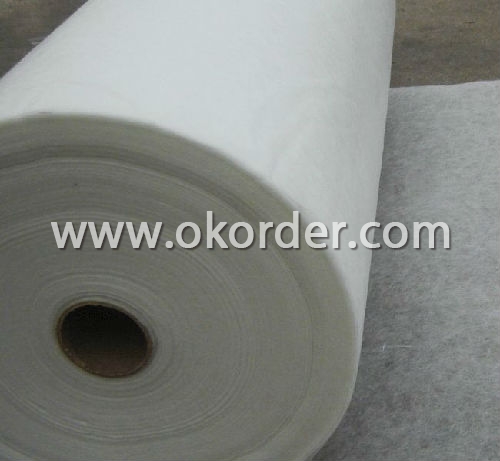
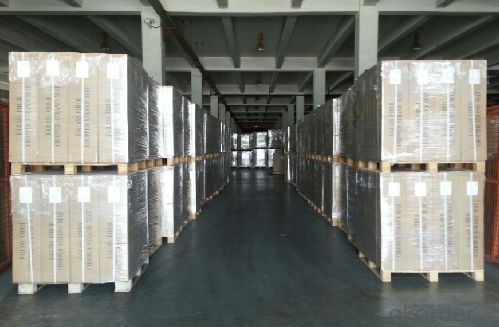
- Q:Can fiberglass mat tissue be used for automotive repairs?
- Yes, fiberglass mat tissue can be used for automotive repairs. It is commonly used for reinforcing and repairing various parts of a vehicle, such as body panels, bumpers, and interior components. The fiberglass mat tissue provides strength, durability, and flexibility, making it an ideal material for automotive repairs.
- Q:What is the abrasion resistance of fiberglass mat tissue?
- The abrasion resistance of fiberglass mat tissue is relatively high. Fiberglass mat tissue is made up of fine fibers of glass that are woven or pressed together to form a mat. These fibers are known for their strength and durability, making them resistant to abrasion. This means that the fiberglass mat tissue is less likely to wear, tear, or become damaged when subjected to friction or rubbing against other surfaces. It can withstand the scraping, scratching, or rubbing action without losing its integrity or structural integrity. Therefore, fiberglass mat tissue is often used in applications where abrasion resistance is important, such as in the construction industry for reinforcing concrete or in the manufacturing of composite materials.
- Q:What are the different thickness tolerances for fiberglass mat tissue?
- The thickness tolerances for fiberglass mat tissue can differ depending on the manufacturer and product specifications. Generally, fiberglass mat tissue is offered in a range of thickness tolerances from 0.5 millimeters (mm) to 3 mm. The tolerance represents the acceptable range of thickness variation within a product. For instance, a fiberglass mat tissue with a thickness tolerance of +/- 0.5 mm means that the actual thickness can deviate by up to 0.5 mm in either direction from the specified thickness. The required tolerance for a specific application depends on the intended use and desired precision. Thicker fiberglass mat tissues with smaller tolerances are commonly utilized in applications that demand greater strength and durability, like reinforcing concrete in the construction industry or manufacturing composite materials. Conversely, thinner fiberglass mat tissues with larger tolerances may be employed in applications where flexibility and conformability take precedence, such as insulation or soundproofing in the automotive industry. To obtain accurate information regarding available thickness tolerances for fiberglass mat tissue, it is crucial to refer to the manufacturer's specifications or contact a supplier. These tolerances can significantly vary based on the specific product and supplier.
- Q:Is fiberglass mat tissue resistant to mold growth?
- Indeed, mold growth is effectively resisted by fiberglass mat tissue. The composition of fiberglass involves the interlacing of tightly woven glass fibers, yielding a substance highly impervious to moisture and mold. Moreover, fiberglass possesses a non-porous nature, signifying its inability to absorb water, thereby further deterring the proliferation of mold. Consequently, fiberglass mat tissue emerges as an optimal selection for circumstances necessitating mold resistance, such as insulation, wallboards, and various construction materials.
- Q:How is fiberglass mat tissue used in the production of agricultural equipment?
- Fiberglass mat tissue is used in the production of agricultural equipment as a reinforcing material. It is typically applied to the surface of the equipment, such as tractor bodies or storage tanks, to provide strength, durability, and resistance to environmental elements. The fiberglass mat tissue helps in enhancing the structural integrity of the equipment, making it more reliable and long-lasting for agricultural applications.
- Q:How does fiberglass mat tissue perform in high temperatures?
- Fiberglass mat tissue performs well in high temperatures as it has a high melting point and excellent heat resistance. It retains its strength and structural integrity even when exposed to elevated temperatures, making it suitable for various applications in high-temperature environments.
- Q:Can fiberglass mat tissue be used for mold making?
- Typically, fiberglass mat tissue is not employed in the process of mold making. Instead, it serves as a thin and lightweight substance composed of interwoven fiberglass strands. Its primary function lies in fortifying and bolstering composite materials, particularly fiberglass laminates. When it comes to mold making, silicone rubber, urethane rubber, or latex are commonly utilized materials. These possess flexibility and possess the ability to impeccably capture intricate details, making them optimal for generating molds of various objects. Furthermore, they possess excellent release properties, thereby facilitating the effortless removal of the mold from its original counterpart. Conversely, fiberglass mat tissue is rigid and lacks the necessary flexibility required in mold making. Rather, it finds greater suitability in applications necessitating strength and reinforcement, as opposed to the replication of intricate shapes or the creation of molds. Hence, if your aim is to fabricate molds, it is advised to select a material explicitly intended for that purpose, instead of utilizing fiberglass mat tissue.
- Q:Does fiberglass mat tissue provide any UV resistance?
- Indeed, some degree of UV resistance is typically offered by fiberglass mat tissue. Comprised of glass fibers embedded in a resin matrix, this material provides a certain level of safeguard against UV radiation emitted by the sun. Nevertheless, it should be emphasized that the extent of UV resistance may differ based on the precise composition and manufacturing procedure of the fiberglass mat tissue. Furthermore, extended exposure to UV radiation can still result in gradual deterioration. Therefore, it is advisable to implement suitable measures, such as employing UV-resistant coatings or finishes, to augment the longevity and resilience of fiberglass mat tissue when utilized outdoors.
- Q:Is fiberglass mat tissue suitable for HVAC insulation?
- Yes, fiberglass mat tissue is suitable for HVAC insulation. Fiberglass mat tissue is a lightweight and flexible material that is commonly used in insulation applications due to its excellent thermal insulation properties. It provides effective heat insulation, helping to maintain a comfortable and energy-efficient environment within HVAC systems. Additionally, fiberglass mat tissue is resistant to moisture and does not promote the growth of mold or mildew, making it a suitable choice for HVAC insulation where condensation and moisture may be present. It is also easy to install and can be cut to fit around HVAC components, ensuring a proper and tight insulation seal. Overall, fiberglass mat tissue is a reliable and durable insulation material that is widely used in HVAC systems to enhance energy efficiency and thermal performance.
- Q:What is the tear resistance of fiberglass mat tissue?
- The tear resistance of fiberglass mat tissue is typically high, making it a strong and durable material that is resistant to tearing.
1. Manufacturer Overview |
|
|---|---|
| Location | Zhejiang, China |
| Year Established | 1969 |
| Annual Output Value | Above US$ 150 Million |
| Main Markets | overseas companies in Hongkong, Canada, South Africa, South Korea, India, Italy, Singapore, France and many other countries and regions. |
| Company Certifications | ISO9001;ISO14001 |
2. Manufacturer Certificates |
|
|---|---|
| a) Certification Name | |
| Range | |
| Reference | |
| Validity Period | |
3. Manufacturer Capability |
|
|---|---|
| a)Trade Capacity | |
| Nearest Port | Shanghai |
| Export Percentage | 40%-50% |
| No.of Employees in Trade Department | 21-50 People |
| Language Spoken: | English |
| b)Factory Information | |
| Factory Size: | Above 5000,000 square meters |
| No. of Production Lines | Above 5 |
| Contract Manufacturing | |
| Product Price Range | Average |
Send your message to us
C-glass Chopped Strand Mat Fiberglass Raw Material
- Loading Port:
- China Main Port
- Payment Terms:
- TT or LC
- Min Order Qty:
- 20000 kg
- Supply Capability:
- 600000 kg/month
OKorder Service Pledge
OKorder Financial Service
Similar products
New products
Hot products
Hot Searches
Related keywords
